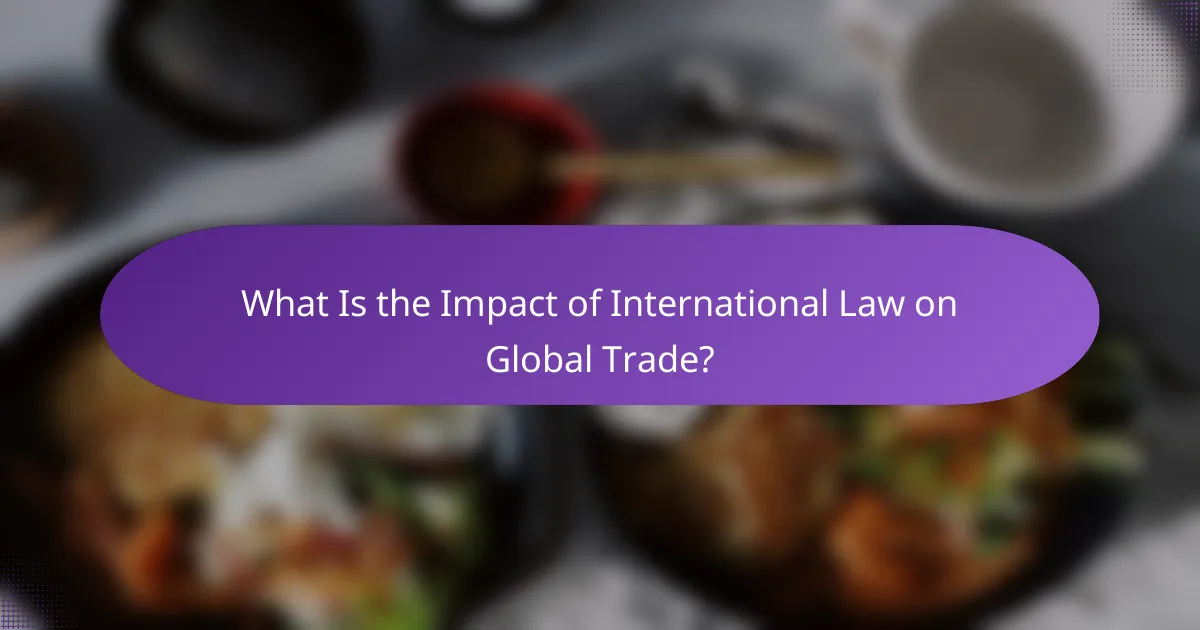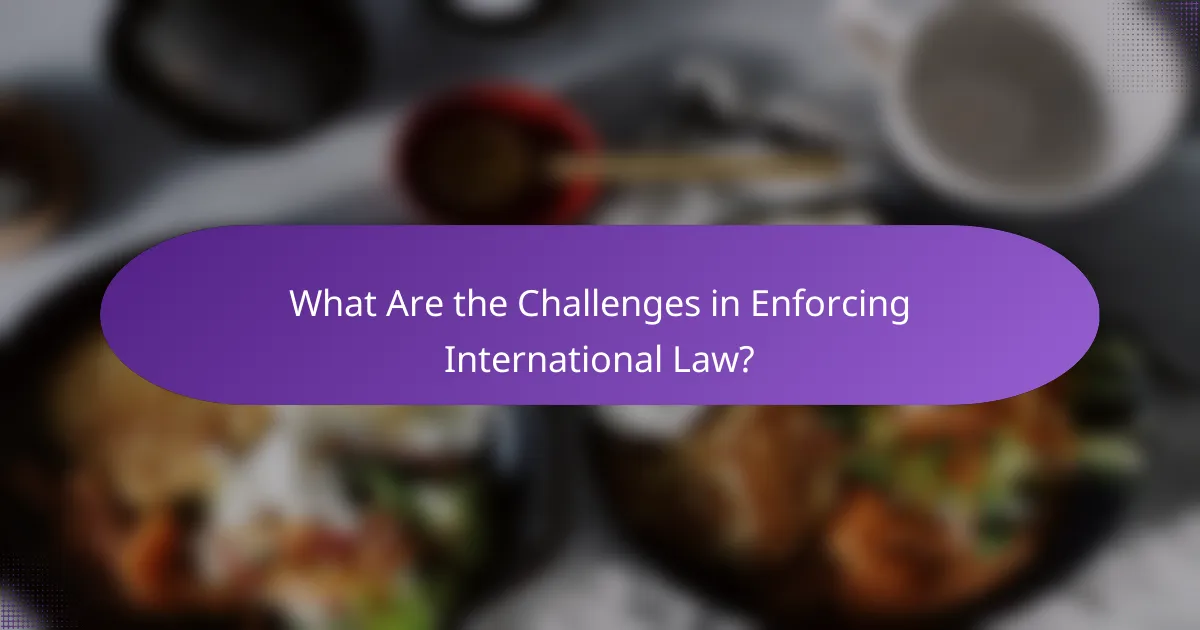International law encompasses a range of protection mechanisms, including treaties, customary laws, and human rights instruments, which collectively establish frameworks for state conduct and individual rights. Compliance is ensured through national legislation and monitoring bodies, which work to uphold international agreements and address violations. Additionally, international law plays a crucial role in global trade by setting rules that facilitate transactions and promote fair competition among nations.

What Are the Key Protection Mechanisms in International Law?
The key protection mechanisms in international law include treaties, customary laws, judicial decisions, international organizations, and human rights instruments. These mechanisms work together to establish legal frameworks that govern the conduct of states and protect individuals’ rights globally.
Treaties and Conventions
Treaties and conventions are formal agreements between states that create binding legal obligations. They can cover a wide range of issues, from trade to environmental protection, and often require ratification by national legislatures to become effective. Examples include the United Nations Charter and the Paris Agreement on climate change.
States must adhere to the terms of treaties they ratify, which can lead to legal consequences for non-compliance. Monitoring bodies, such as the International Court of Justice, may adjudicate disputes arising from treaty interpretations.
Customary International Law
Customary international law consists of practices and norms that have evolved over time and are accepted as legally binding by states. These unwritten rules emerge from consistent state behavior and a belief that such practices are obligatory. Examples include the prohibition of torture and the principle of non-refoulement in refugee law.
Customary laws can be difficult to identify and prove, as they rely on state practice and opinio juris (belief that a practice is legally required). However, they play a crucial role in filling gaps where treaties may not exist.
Judicial Decisions
Judicial decisions from international courts and tribunals contribute to the development and clarification of international law. Courts such as the International Court of Justice and the International Criminal Court interpret treaties and customary laws, providing authoritative rulings that states are expected to follow.
These decisions can set important precedents, influencing future cases and state behavior. However, enforcement of these rulings can be challenging, as compliance often depends on the willingness of states to adhere to international norms.
International Organizations
International organizations, such as the United Nations and the World Trade Organization, play a vital role in promoting and enforcing international law. They facilitate cooperation among states, provide forums for negotiation, and monitor compliance with international agreements.
These organizations often have the authority to impose sanctions or take collective action against states that violate international law. Their effectiveness can vary based on member states’ political will and cooperation.
Human Rights Instruments
Human rights instruments are treaties and declarations that establish fundamental rights and freedoms for individuals. Key documents include the Universal Declaration of Human Rights and the International Covenant on Civil and Political Rights. These instruments obligate states to respect, protect, and fulfill human rights within their jurisdictions.
Compliance with human rights instruments is monitored by various committees and bodies, which can issue recommendations and reports. States that fail to comply may face international scrutiny and pressure from other nations and civil society organizations.

How Do Countries Ensure Compliance with International Law?
Countries ensure compliance with international law through a combination of national legislation, monitoring bodies, and enforcement mechanisms. These strategies help uphold international agreements and standards while addressing violations effectively.
National Legislation
National legislation plays a crucial role in ensuring compliance with international law by incorporating international treaties and agreements into domestic law. This process often involves amending existing laws or creating new statutes that reflect international obligations.
For instance, many countries adopt specific laws that align with human rights treaties, thereby providing a legal framework for enforcement. This alignment helps ensure that domestic courts can address violations effectively.
Monitoring Bodies
Monitoring bodies are essential for overseeing compliance with international law, often established by treaties or international organizations. These bodies assess whether countries adhere to their commitments and can provide recommendations for improvement.
Examples include the United Nations Human Rights Council and the International Criminal Court, which monitor state actions and can issue reports on compliance. Countries may face diplomatic pressure or reputational consequences if they fail to comply with the findings of these bodies.
Enforcement Mechanisms
Enforcement mechanisms vary widely and can include diplomatic measures, economic sanctions, or legal actions in international courts. These mechanisms are designed to compel compliance from states that violate international law.
For example, the United Nations Security Council can impose sanctions on countries that breach international agreements. Additionally, states may pursue legal action against one another in international tribunals, seeking remedies for violations.

What Is the Impact of International Law on Global Trade?
International law significantly influences global trade by establishing rules and standards that govern trade relations between countries. These regulations help facilitate smoother transactions, reduce trade barriers, and promote fair competition.
Trade Agreements
Trade agreements are formal arrangements between countries that outline the terms of trade, including tariffs, import quotas, and standards for goods and services. They can be bilateral (between two countries) or multilateral (involving multiple nations), such as the North American Free Trade Agreement (NAFTA) or the European Union (EU) agreements.
These agreements aim to enhance trade by reducing barriers and creating a more predictable trading environment. Countries often negotiate terms that benefit their economies, leading to increased exports and imports, which can stimulate economic growth.
Dispute Resolution Mechanisms
Dispute resolution mechanisms are essential components of international trade law, providing processes to resolve conflicts that arise between trading partners. Common mechanisms include arbitration and mediation, which offer neutral grounds for resolving disputes without resorting to litigation.
For example, the World Trade Organization (WTO) has a structured process for addressing trade disputes, allowing countries to bring grievances against one another. Effective dispute resolution helps maintain trade relations and ensures compliance with international agreements.
Impact on National Policies
International law influences national policies by requiring countries to align their domestic regulations with international standards. This alignment can affect various sectors, including labor laws, environmental regulations, and product safety standards.
Countries may need to adjust their policies to comply with trade agreements, which can lead to improved practices and competitiveness. However, this can also create challenges, as domestic industries may resist changes that affect their operations or profitability.

What Are the Challenges in Enforcing International Law?
Enforcing international law faces significant challenges that hinder its effectiveness. Key issues include state sovereignty, the lack of universal jurisdiction, and insufficient political will among nations.
State Sovereignty Issues
State sovereignty often limits the enforcement of international law, as countries prioritize their own laws and interests over international obligations. This can lead to reluctance in cooperating with international bodies or complying with rulings from courts such as the International Court of Justice.
For example, a nation may refuse to extradite individuals accused of war crimes, citing its sovereignty. Such actions undermine international legal frameworks and create barriers to accountability.
Lack of Universal Jurisdiction
The absence of universal jurisdiction complicates the enforcement of international law, as not all countries recognize the authority of international courts. This means that perpetrators of serious crimes, such as genocide or crimes against humanity, may evade justice if they reside in nations unwilling to prosecute.
Some countries have adopted laws allowing for universal jurisdiction, but these are not universally accepted. This inconsistency creates a patchwork of enforcement that can leave victims without recourse.
Political Will
Political will is crucial for the enforcement of international law, yet it is often lacking. Countries may hesitate to act against allies or powerful states due to geopolitical considerations, which can lead to selective enforcement.
For instance, a country may choose not to intervene in human rights violations in another nation due to economic ties or strategic partnerships. This reluctance can perpetuate impunity and weaken the overall effectiveness of international legal mechanisms.

How Does International Law Address Environmental Protection?
International law addresses environmental protection through a framework of treaties, agreements, and regulations aimed at preserving ecosystems and promoting sustainable practices globally. These legal instruments establish obligations for countries to mitigate environmental harm and promote conservation efforts.
International Environmental Treaties
International environmental treaties are formal agreements between countries that set specific obligations for environmental protection. Examples include the Paris Agreement on climate change and the Convention on Biological Diversity, which aim to combat global warming and preserve biodiversity, respectively.
These treaties often require participating nations to report on their progress and implement national policies that align with international goals. Compliance mechanisms may include regular assessments, financial support for developing countries, and sanctions for non-compliance.
Countries typically negotiate these treaties through international organizations such as the United Nations, which facilitates discussions and helps establish common standards. Understanding the specific commitments and timelines within these treaties is crucial for effective implementation at the national level.


